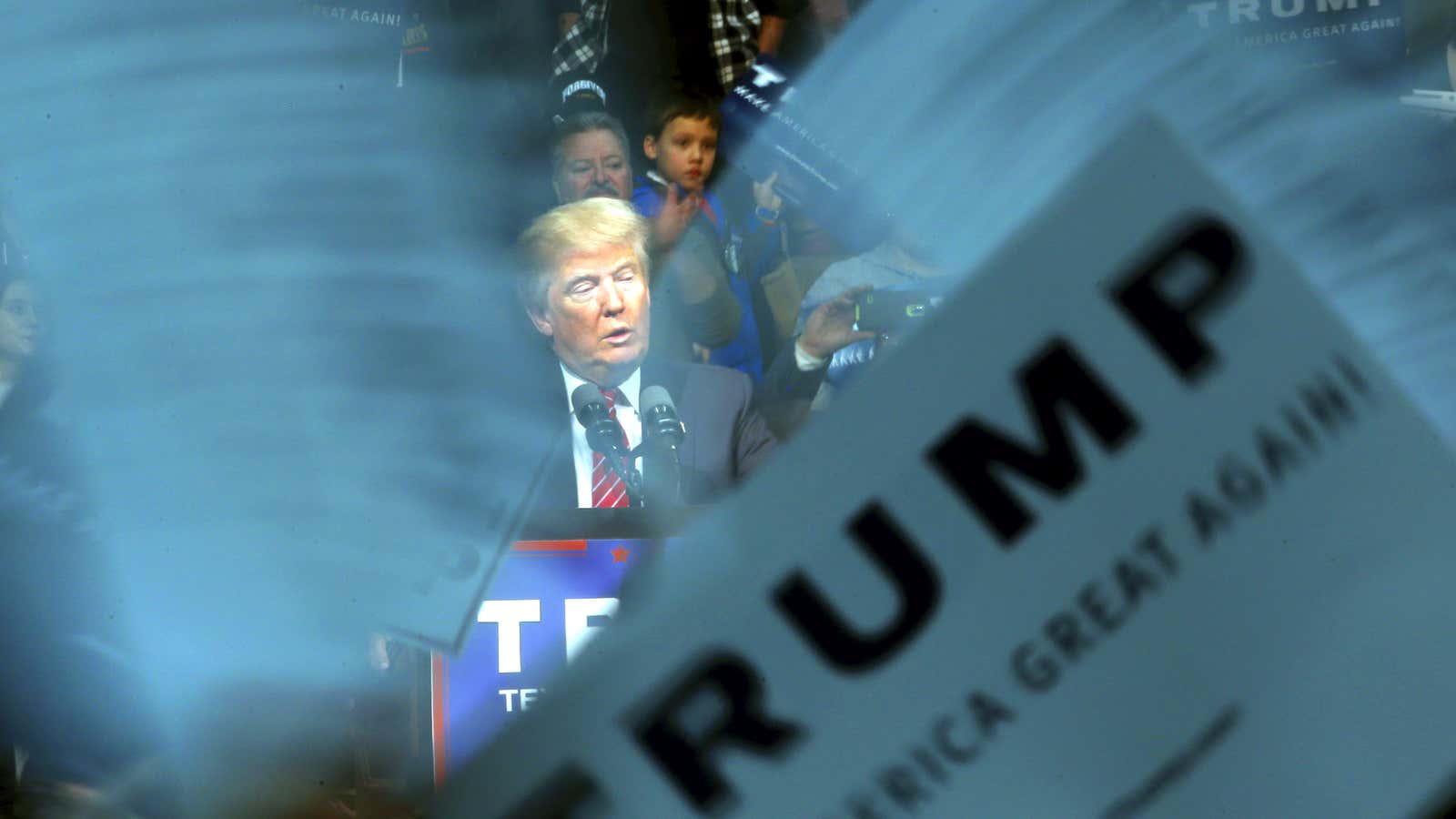On visas, Donald Trump is everywhere you want to be.
The presumptive Republican nominee performed a virtuoso flip-flop in last night’s GOP debate when he was asked about H1-B visas, used by corporations to admit several hundred thousand skilled temporary workers to the United States every year.
First, some background: Trump’s website attacks his rivals’ support for the visas, noting that Marco Rubio, “Mark Zuckerberg’s personal Senator,” has “a bill to triple H-1Bs that would decimate women and minorities.”
Asked about this in October, Trump said, “I never said that. I never said that,” claiming that he supported Zuckerberg’s goals.
“I am all in favor of keeping these talented people here so they can go to work in Silicon Valley,” he said, referring to foreign students who graduate from US universities but must leave the country when their student visa expires. Immigration reform advocates say these students should have direct access to H1-Bs or a path to citizenship so the US economy can benefit from the training they received.
It was a smooth slide into a mainstream position adopted by many a Republican senator eager to court big business.
Catch me if you can
Back to last night: Trump was again pressed about his conflicting approaches to the skilled worker visas, and confirmed his change of heart.
“I’m changing. I’m changing,” he said. “We need highly skilled people in this country, and if we can’t do it, we’ll get them in. But, and we do need in Silicon Valley, we absolutely have to have.”
Asked whether his propensity to change would apply to more draconian proposals for a Mexican border wall or to deport 11 million undocumented immigrants, Trump assured watchers, “we’re going to stop people from coming into our country illegally.”
This morning, in a move that should surprise no one, Trump flopped back on the H1-B program: ”I will end forever the use of the H-1B as a cheap labor program, and institute an absolute requirement to hire American workers first for every visa and immigration program.”
Facts? What facts?
Trump’s apparent immunity to fact-checking should give Democrats pause.
The presumptive Republican nominee, fracturing coalition notwithstanding, is considered to be general election poison for very good reasons: His incredible alienation of minority voters, along with some fraction of the Republican party, could be enough to guarantee a Democratic win in the US’ polarized political climate.
But Hillary Clinton, the presumptive Democratic nominee, is polarizing herself, and it’s not at all hard to imagine Republicans uniting around Trump to defeat her. (Schemes to run a “true Republican” candidate on an independent ballot face pressing deadlines and logistical obstacles.)
Trump would need to massively increase turn-out among less-educated white voters—you can explore some suggestive scenarios here—but if anyone can do it, he can. One of the biggest predictors of whether a voter will back Trump is the belief that “many whites are unable to find a job because employers are hiring minorities instead.”
And attempts to convince these voters that Trump will betray them in the end—whether through his confusing position on H1-B visas or the rampant use of guestworkers at Trump’s own businesses—may be harder than Republican and Democratic strategists would like to admit.
Explaining the flop-back
Perhaps Trump had a conversation with his recent endorser, Senator Jeff Sessions, long an opponent of skilled worker visas and a representative of the white, economic nationalist wing of the Republican party Trump has excited so well.
The take-away, however, is that pinning down Trump’s real positions, even on a debate stage, won’t be easy—a theme echoed in his handling of health care in last week’s Republican meet-up. He’ll say what he wants or needs to say at the time, and use his social-media power to revise and extend his remarks as needed—apparently, without consequence.
Trump’s Republican opponents missed an opportunity to cast him as a flip-flopper early in the race; now his brand as a truth-teller is so ingrained in the minds of his supporters that the media or a rival will have little luck convincing them Trump is untrustworthy.
And that may make him as dangerous in November to the Democratic nominee as he has been in March to his fellow Republicans.
